#sustainable development
Text
Sustainable Jobs for Autistic People

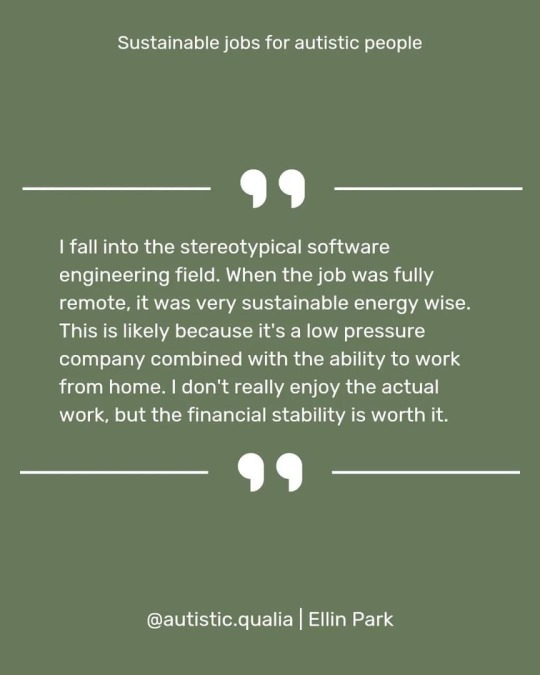
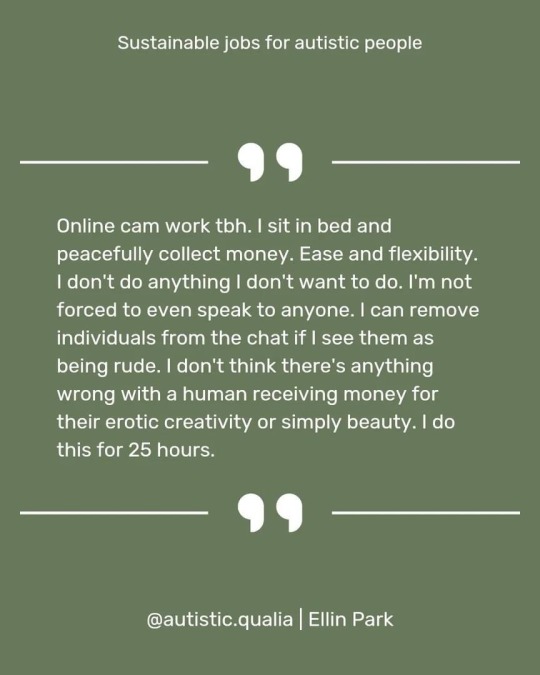

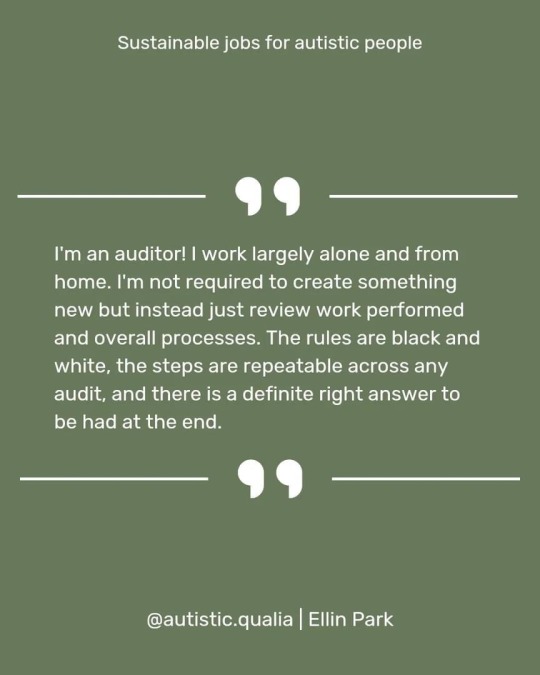
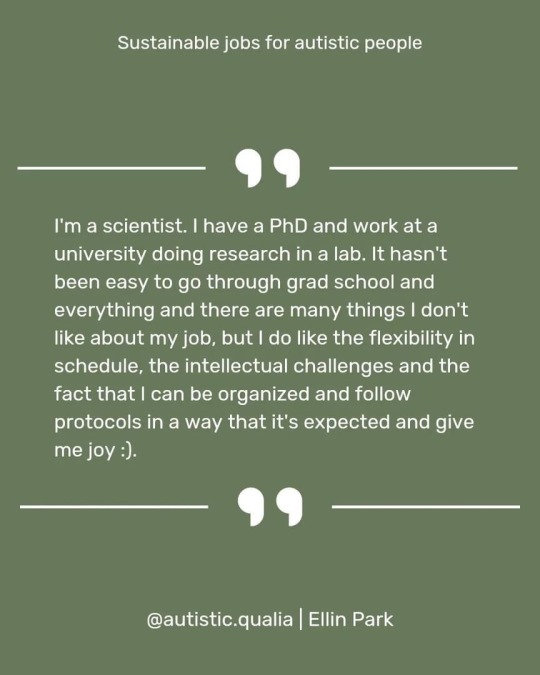
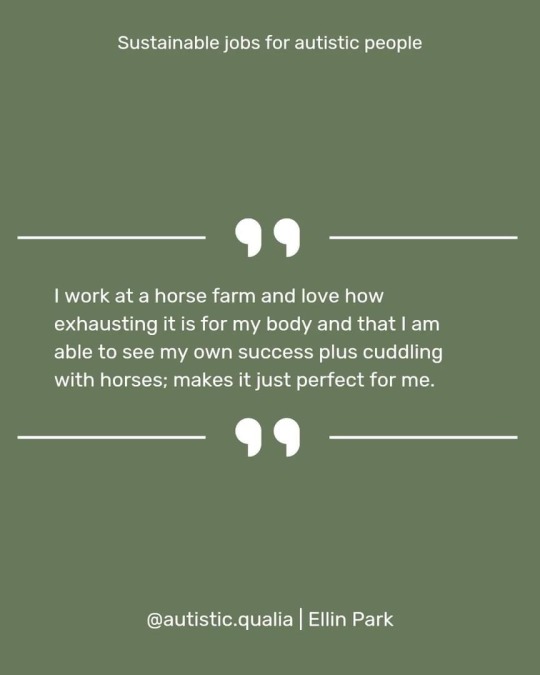
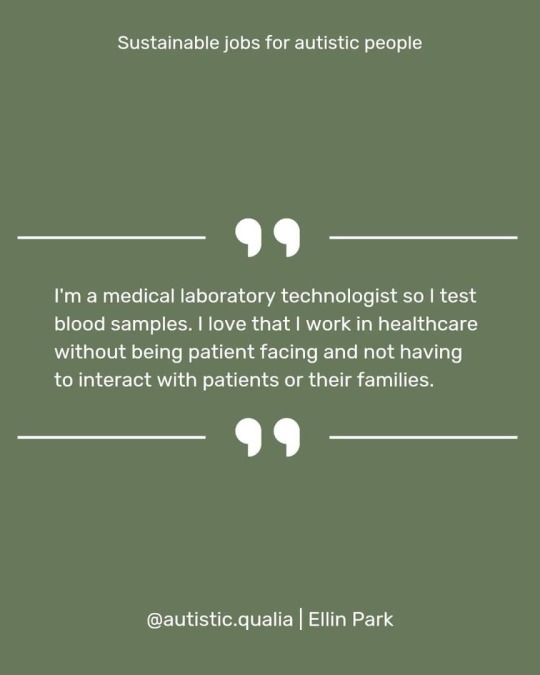
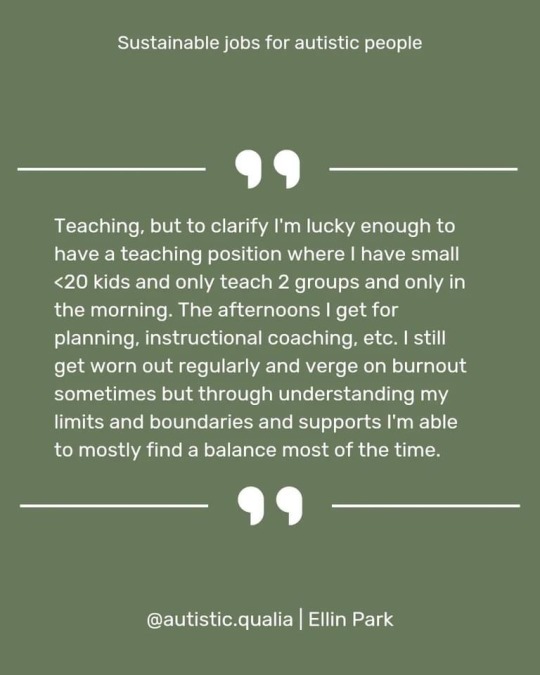
Autistic Qualia
#autism#actually autistic#employment#jobs for autistic people#sustainable development#job hunting#neurodivergence#neurodiversity#actually neurodivergent#feel free to share/reblog#Autistic Qualia (Facebook)
323 notes
·
View notes
Link
Green growth, which is currently the most accepted path to a sustainable future, posits that economic output can continue to expand in a sustainable way by shifting to renewable energy and circular economies. Most governments around the world that recognize the need for climate action promote economic growth through green investment, decarbonized industrial policies and sustainable business practices. But there is growing doubt about whether these strategies will be enough to avert climate disaster. As climate activist Greta Thunberg famously said at the United Nations Climate Action Summit in 2019, “We are in the beginning of a mass extinction, and all you can talk about is money and fairy tales of eternal economic growth.”
This critique of economic growth is not only being made by activists. It is also on the rise in academic research. Green growth is increasingly being challenged on empirical grounds. Indeed, scientific evidence from recent years shows that if the high-emitting countries of the Global North continue to pursue green growth, it is extremely unlikely that greenhouse gas emissions will be reduced at the rate and scale needed to avoid climate collapse. And in an increasingly robust body of scientific literature, ecological economists have identified the limits of the growth paradigm, including the paradox that more efficient use of resources often lowers their costs and thus ultimately leads to greater use.
These ideas have come to be known collectively as “degrowth,” which calls for a planned contraction of economic activity aimed at increasing wellbeing and equality. Degrowth argues that to achieve sustainability, so-called developed countries need to abandon the objective of GDP growth and scale down less necessary and destructive forms of production to reduce energy and material use.
Reducing inequality is often at the heart of policy proposals advanced by degrowth advocates. Among other things, they focus on reducing working time for all and introducing maximum income limits. At the same, degrowth also seeks to improve public services and enable sustainable development globally, through reparations as well as by curbing unequal exchange in international trade.
[...]
A recent paper in Nature summarized five key policy areas at the heart of the degrowth agenda, suggesting ways that countries in the Global North could rapidly reduce emissions while improving social well-being.
First, scaling down those sectors of the economy that cannot be made sustainable in time or mainly serve elite consumption, such as fossil fuels, fast fashion, advertising and aviation. Second, government provision of “universal public services” such as “high-quality health care, education, housing, transportation, Internet, renewable energy and nutritious food.” Third, introducing a green jobs guarantee, mobilizing labor for the ecological transition and improving social care. Fourth, reducing working time to not only lower the carbon emissions of production and stabilize employment, but also to free people to enjoy more time not working. And finally, enabling sustainable development globally by canceling Global South debt, curbing unequal exchange in international trade and ultimately instituting ecological reparations.
111 notes
·
View notes
Text
Computational design on the Biorock Pavilion:
Excerpt from Dezeen article:
The Biorock Pavilion is a concept for an amphitheatre-like event space that could be grown underwater. The form of the building is based on that of a seashell, as well as mathematical forms.
The basis of the pavilion would be a skeletal structure comprised of a network of very thin steel rods, which would be immersed in a solution of minerals.
It would be grown by electrodeposition of minerals
An electric current would then be run through the steel skeleton, allowing the remainder of the pavilion to be 'grown' as the minerals calcify atop the base structure.
"It takes those minerals out of the seawater and produces a structure similar to reinforced concrete," stated Pawlyn. "This uses an absolute minimum of material to grow a whole building."
#biomimicry#biodesign#bio inspired#ecopunk#solarpunk#architecture#sustainable development#sustainable design#computational design#sustainable architecture#Michael Pawlyn#lol if you saw me accidentally post this on my studyblr no you didn't
38 notes
·
View notes
Text
#good news#science#environmentalism#nature#environment#animals#renewable power#renewable energy#sustainable development#sustainability#animal protection#nature conservation
13 notes
·
View notes
Text
i'm obsessed with the idea that sustainability is nurturing. i'm obsessed with healing being healing for all of us. i'm obsessed with the way that looking after our environment so mirrors looking after our bodies and our minds. i'm obsessed with integrating this.
when i was in my late teens going through burnout and starting my enviro sci degree I remember comparing what was going on in my head with planetary overshoot. as in when we've gone through so much in one year that we've borrowed some from the future, more than used up the resources for that one year. I did that with my brain then, and I did it again now. I need to stop, I can't sustain this. we need to stop doing this to the planet, we can't sustain it.
but no one overworks themselves unless they think it's going to get them something. no one overworks themselves unless they're scared not to. unless that option might be somehow worse. i know it was for me. trying to get off the grind but when it was either that or feel nothing? I don't know what to choose. I needed to meet my needs elsewhere. same goes with the greedy exploiters of the planet, they need to be stopped, yes, but they're all chasing something. we all are. sustainability is simply meeting those needs in healthy ways.
#sustainability#sustainable development#sustainable development goals#human rights#climate action#overshoot#planetary boundaries#climate change#biodiversity#ecological footprint#ecological solutions
15 notes
·
View notes
Photo

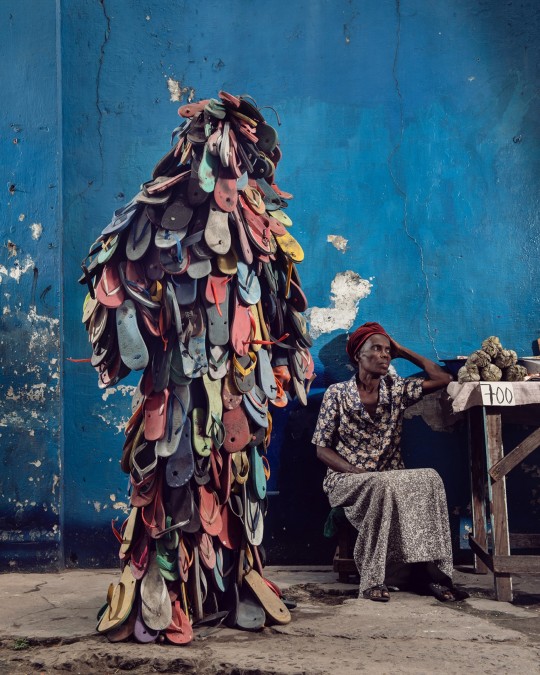
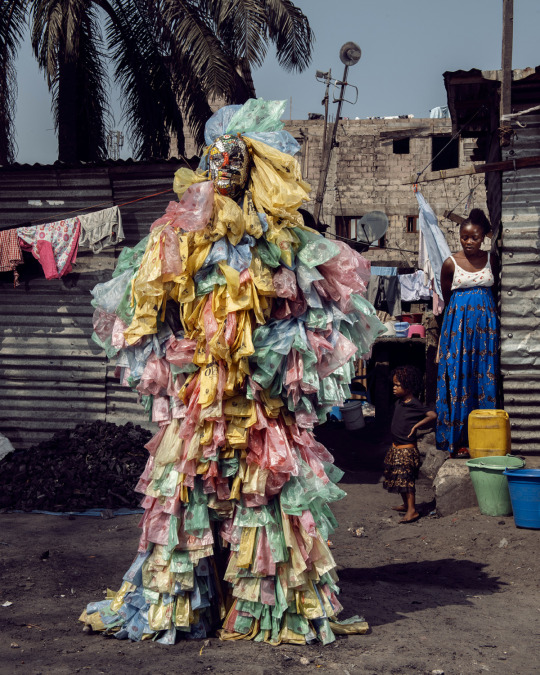

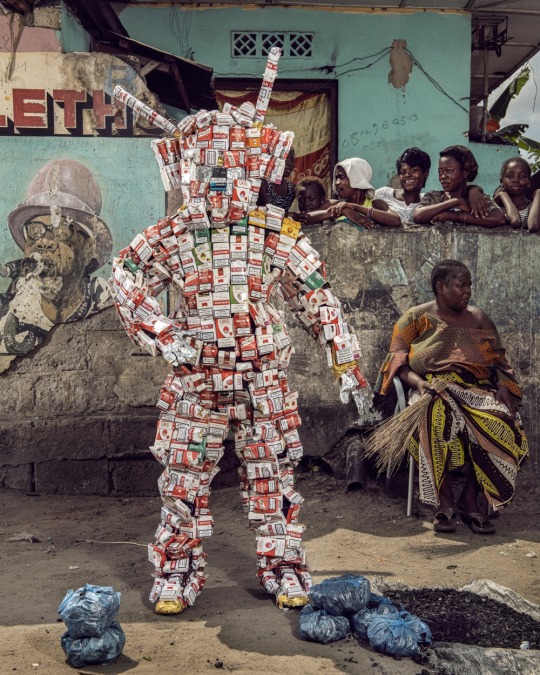





Transforming Trash into Protest Art
The second largest country in Africa, the Democratic Republic of Congo has one of the richest sub-soils in the world in gold, coltan, diamonds, cobalt, oil... and yet remains the 8th poorest country on the planet.
The Congolese are among the biggest losers of globalisation. They rarely benefit from the products manufactured with the resources drawn from their country. In general, these products reappear in Africa in the third or fourth generation; at best they are outdated, but more often than not, they are no more than the waste products of industrialised countries that prefer to relocate their processing.
The DRC is experiencing an ecological scandal, but just as an alchemist transforms lead into gold, "Ndaku, la vie est belle" was born from these tons of rubbish. It was founded six years ago in Kinshasa by the artist Eddy Ekete, and today it brings together nearly 25 artists, almost all of whom were trained at the Kinshasa Academy of Fine Arts.
Painters, singers, visual artists and musicians have joined forces to denounce the tragedy of their daily lives, the wars that have resulted from them, the exploitation of women and men that stems from them and ferments the unfathomable misery that robs them of their dignity.
Originally, these artists had in common that they had no resources, no support and that they lived in a shanty town in Kinshasa, built on land filled with tons of untreated waste. Naturally, they found an abundance of free raw material in these remains.
Mobile phones, plastic, corks, everything is raw material - and yet already industrialised! - to denounce the chaos in which the country is kept.
If Congo Kinshasa has partly lost its animist and mystic traditions under the pressure of Catholicism and colonisation, the artists of the collective "Ndaku, la vie est belle" return to the traditional source of the African mask.
Courtesy of Stephan Gladieu
#art#congo#DRC#trash#sustainability#equal rights#stephan gladieu#mask#africa#sustainable development#eddyekete#upcycling#recycling#streetart#human rights#ecology#fashion#costumes#kinshasa#globalisation#ndaku#poetry#hope
185 notes
·
View notes
Text
Great Idea 22: Sustainable urbanism

The trend toward complete communities shapes the debate on sustainability and environmentalism, and vice-versa. Read more.
#great ideas#new urbanism#urban design#urbanism#cities#walkability#communities#environment#sustainability#sustainable design#sustainable development
9 notes
·
View notes
Text
Comment la ville de Courbevoie est devenue un leader mondial dans la lutte contre le gaspillage alimentaire (par Arash DERAMBARSH dans REVUE POLITIQUE ET PARLEMENTAIRE).
Depuis l’adoption de la loi contre le gaspillage alimentaire, votée le 11 février 2016, les supermarchés ont l’obligation de reverser leurs invendus à des associations caritatives.[1]
Ainsi, cette loi a rapidement prouvé ses effets bénéfiques : plus de 10 millions de repas sont distribués chaque année en France. Cela représente une augmentation de 22 % des dons alimentaires destinés aux associations caritatives.
De plus, nous veillons à la bonne application de la loi.
Accompagnés de lanceurs d’alerte et d’huissiers de justice, nous n’avons cessé d’inspecter les poubelles à côté des supermarchés pour constater les atteintes à la loi.
Après avoir constaté que plusieurs magasins continuaient de jeter les invendus alimentaires à la poubelle, nous avons déposé de nombreuses plaintes à leur encontre. Les procédures fonctionnent et sont un moyen de dissuasion efficace. Sans compter les « Bad buzz » et la mauvaise réputation des magasins récalcitrants.
Mais cela n’a pas suffi et il fallait donc aller plus loin.
Ainsi qui mieux qu’une municipalité pour appliquer la loi contre le gaspillage alimentaire et devenir un laboratoire mondial ?
La ville de Courbevoie a reçu les agents de l’Organisation des Nations Unies pour l’alimentation et l’agriculture (FAO) le 2 vendredi février 2024.
Ils sont venus de Rome pour constater et valider l’officialisation d’un chiffre record : 400 000 repas ont été économisés et redistribués à des associations caritatives pour que les démunis (classe moyenne représentant des mères ou pères célibataires élevant plusieurs enfants, des retraités, des chômeurs ou encore des étudiants) puissent manger à leur faim.[2]
Cette situation sociale démontre d’ailleurs que même dans une ville d’apparence « riche », la pauvreté a de multiples facettes. La pauvreté augmente et la classe moyenne décline.
Ainsi dans un rapport alarmant, le Secours Catholique a estimé que près de 10 % des Français ont recours à l’aide alimentaire.[3]
En effet, « entre 5 et 7 millions de personnes » ont eu recours à l’aide alimentaire en 2020 alerte le Secours Catholique dans son rapport annuel sur l’état de la pauvreté en France publié sur la base des données de la Direction générale de la cohésion sociale (DGCS).[4]
La ville de Courbevoie a donc fait preuve d’inventivité dans sa lutte contre le gaspillage alimentaire.[5]
Depuis 2020, avec son Maire Jacques Kossowski, nous avons lancé une campagne pour mettre fin au gaspillage alimentaire.
En France, le mandat d’un élu municipal est de six ans. L’objectif était donc de faire de notre ville un laboratoire mondial.
Avant toute chose, il convenait de faire un premier constat.
Depuis le 11 février 2016, la règle interdisant le gaspillage alimentaire est limitée aux seuls magasins de plus de 400 m2.
La loi a permis la distribution de plus de 10 millions de repas par an et ses effets positifs se sont immédiatement fait sentir.
C’est en effet une hausse de plus de 22 % d’invendus alimentaires qui sont destinés chaque année aux associations caritatives.
Cette loi a été applaudie dans le monde entier.
Mais au niveau local, il y a encore des marges de manœuvres permettant de faire reculer ce fléau.
En effet, cette loi exonère les deux tiers des supermarché implantés à Courbevoie car leur surface de vente est inférieure à 400 m².
Il a donc été décidé qu’avec l’aide de plusieurs start-up et acteurs sociaux et économiques, une charte contre le gaspillage alimentaire serait votée chaque année dans toutes les sphères d’activité de la ville :
2020 avec tous les supermarchés situés dans la ville sans délimitation de superficie
2021 avec restauration hospitalière
2022 avec restauration scolaire
2023 auprès des commerces alimentaires (commerces de bouche, restaurants, boulangeries, marchés)
2024 avec les maisons de retraite
Ces chartes d’engagement, une première en France, ont un objectif multiple :
Créer des synergies pour que chacun puisse prendre part à ce combat et adapter ses pratiques
Participer à la sensibilisation du grand public à la lutte contre le gaspillage alimentaire
Contribuer à réduire l’impact économique de ces déchets
Mettre en place des partenariats de dons alimentaires en faveur des associations conformément à la loi
Promouvoir les partenariats avec les associations municipales
Organiser des promotions « anti-gaspi », notamment pour les produits proches de la date limite de consommation (DLC)
Proposer des ventes en gros ou à l’unité afin d’adapter les quantités achetées et réduire les emballages
Favoriser le développement des produits frais, et développer des opérations marketing de sensibilisation (opération « Fruits et Légumes Moches », etc.)
Mener une discussion avec les fournisseurs afin de définir une stratégie de contrôle contre le gaspillage alimentaire (chartes qualité des produits, etc.)
Agir pour valoriser les déchets.
Par ailleurs, le 24 octobre 2022, la ville de Courbevoie a organisé une réunion de travail à l’Assemblée nationale dans le but de proposer un amendement à la législation française contre le gaspillage alimentaire. Les députés Karl Olive et Philippe Juvin étaient présents à la réunion.[6]
La proposition était simple : modifier la loi contre le gaspillage alimentaire promulguée le 11 février 2016.[7]
La ville de Courbevoie a spécifiquement proposé les amendements suivants :
Réduire le plafond actuel de 400 m2 imposé aux supermarchés pour le réduire à au moins 100 m2 afin d’inclure plus de 5 000 points de vente supplémentaires.
Augmenter les amendes actuelles de la 5ème classe représentant 10 000 euros à 20 000 euros contre les supermarchés qui continuent de jeter les invendus alimentaires consommables.
Fort de tout ce travail, la FAO a désigné la ville de Courbevoie « Ville verte mondiale » en 2024, lui accordant ainsi une reconnaissance formelle.
Nous appelons ainsi toutes les communes à décliner ces chartes qui ne coûtent rien aux contribuables.
Comme le rappellent les rapports du projet DrawDown (2020) et du GIEC (2022), la réduction du gaspillage alimentaire est l’une des trois principales solutions pour lutter contre le réchauffement climatique.
Nous ne dirons pas que nous n’étions pas informés.
Arash Derambarsh
Adjoint au maire en charge du développement durable dans la commune de Courbevoie
Il est à l’origine de la loi contre le gaspillage alimentaire votée le 3 février 2016 en France. En Suède, en 2019, il a reçu le « WIN WIN Gothenburg Sustainability Award ».
—–
[1] Banque Alimentaire : https://www.ba-81.org/actualites/blog-des-b%C3%A9n%C3%A9voles/323-la-france-pionni%C3%A8re-de-la-lutte-contre-le-gaspillage-alimentaire.html
[2] « Courbevoie lutte contre le gaspillage alimentaire » (BFM TV) : https://www.bfmtv.com/paris/replay-emissions/bonjour-paris/hauts-de-seine-courbevoie-lutte-contre-le-gaspillage-alimentaire_VN-202402050155.html
[3] « Pauvreté en France : 10% de la population a eu besoin d’une aide alimentaire en 2020 » (Université Paris Saclay) : http://www.ritm.universite-paris-saclay.fr/poverty-in-france-10-of-the-population-needed-food-aid-in-2020/
[4] Site Ville de Courbevoie : https://www.ville-courbevoie.fr/2195/lutte-contre-le-gaspillage-alimentaire.htm
[5] The law on Food Waste – From Courbevoie to Assembly : https://resource.co/article/law-food-waste-courbevoie-assembly-10198
[6] « Antigaspillage alimentaire: une proposition de loi pour «aller plus loin» (La Voix du Nord) : https://www.lavoixdunord.fr/1252076/article/2022-11-10/antigaspillage-alimentaire-une-proposition-de-loi-pour-aller-plus-loin
[7] Proposition de loi : https://acrobat.adobe.com/id/urn:aaid:sc:EU:727392be-c20e-4f68-b86d-dcc46fca7193
@arashderambarsh @arash-derambarsh
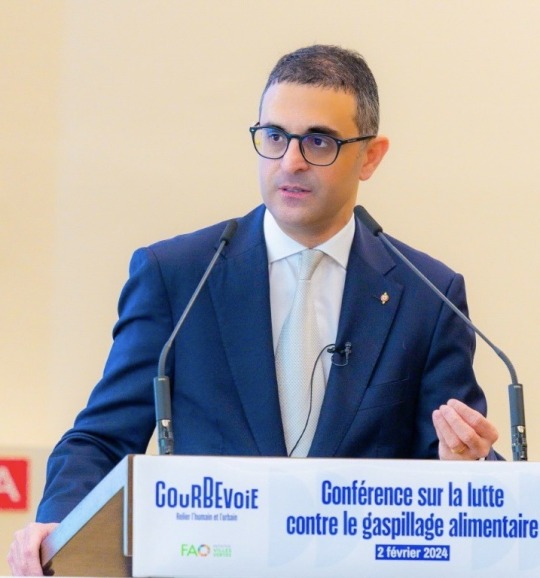
#arash derambarsh#derambarsh#courbevoie#gaspillage alimentaire#arashderambarsh#foodwaste#food waste#ONU#FAO#POLITIQUE#sustainability#développement durable#sustainable development#environment#ecology#food#stop food waste#zéro waste
3 notes
·
View notes
Text
Qhapaq Ñan: Exploring the Sacred Pathway

View On WordPress
#america#Argentina#Bolivia#Chile#Colombia#culture#Economic#Ecuador#Empire#Engineering#heritage#history#Inca#Peru#Qhapaq Ñan#south america#sustainable#sustainable development#trade#travel#UNESCO#United Nations#World Heritage
7 notes
·
View notes
Text
Most of the land humans need to thrive is unprotected, new study finds
2 notes
·
View notes
Text
Chinese Senior Diplomat Calls To Resist Cold War Mentality At BRICS Security Meetings
— Global Times Staff Reporters | July 25, 2023

Photo: BRICS. VCG
Cyber security as well as other threats in traditional and non-traditional security fields have taken the spotlight at the ongoing meetings of BRICS countries in Johannesburg, South Africa, as analysts said that amid growing global uncertainties, more developing countries are seeking to improve solidarity to jointly tackle challenges to their development under the auspices of the BRICS mechanism.
While attending the 13th Meeting of BRICS National Security Advisers and High Representatives on National Security in Johannesburg, South Africa on Tuesday, senior Chinese diplomat Wang Yi said that after more than 10 years of development, the BRICS has become an important platform for emerging market countries and developing countries to unite and self-development.
Under the new situation, we must grasp the future development direction of the BRICS countries, further strengthen political mutual trust and strategic coordination, continue to provide international public goods that meet the requirements of the times, and strive to translate the BRICS spirit of openness, inclusiveness, and win-win cooperation into practical actions, and polish the "golden brand" of BRICS cooperation, Wang said.
To deal with the current global security challenges and solve the security dilemma, Wang also called for countries to resist unilateralism, hegemony and oppose "decoupling" and "double standards" and oppose Cold War mentality and zero-sum game.
Analysts said that the ongoing meetings for security advisors and senior diplomats from BRICS countries and "Friends of BRICS" underscored the security concerns of developing countries and new emerging economies over the destructive activities, "color revolutions" and cyber attacks plotted by some countries who have posed great threats to the stable development of developing countries and global peace.
Aside from expressing their concerns over traditional and non-traditional security fields, BRICS countries and developing countries are seeking to improve solidarity to jointly tackle development challenges under the BRICS mechanism, which will also be part of the build-up to the 15th BRICS Summit in South Africa to be held from August 22 to 24, they noted.
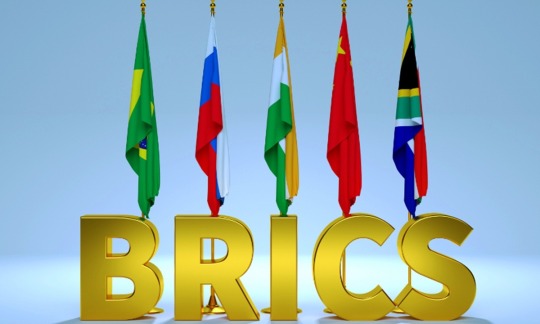
On Monday, a meeting, which was held under the theme of "Cyber security is increasingly becoming a challenge for developing countries," is also being attended by Minister in the Presidency of South Africa Khumbudzo Ntshavheni, Chief Adviser of the Presidency of Brazil Celso Luiz Nunes Amorim, Secretary of the Security Council of the Russian Federation Nikolai Patrushev, National Security Adviser Ajit Doval of India and representatives of Belarus, Iran, Saudi Arabia, Egypt, Burundi, the United Arab Emirates, Kazakhstan, Cuba and other countries.
Security Concerns Under Spotlight
During the Tuesday meeting, Wang, member of the Political Bureau of the Communist Party of China (CPC) Central Committee and also director of the Office of the CPC Central Commission for Foreign Affairs, said that the "Global South" is a collection of emerging market countries and developing countries, reflecting our collective rise on the international stage. Countries in the "Global South" face the important mission of resisting the external intervention and maintaining political security and regime security.
Wang Yi said that unity is strength, action is direction, and openness is motivation. China is willing to work with BRICS partners to support each other's efforts to maintain national security and stability, and to carry out more practical cooperation in dealing with international security challenges, so that the world can hear more BRICS voices and witness a greater role of the BRICS.
Senior officials on security from BRICS countries also exchanged in-depth views on issues such as current security challenges, anti-terrorism and cyber security, food and water security, and energy security, and reached broad consensus, according to a release from Chinese Foreign Ministry.
The issue of cyber security has been discussed at length at the ongoing BRICS meeting as some Western countries have intensified using the internet to conduct destructive activities in other countries, including inciting domestic riots, fooling the public or organizing cyber attacks on governmental departments, which have posed threats to developing countries' stability and development, Song Zhongping, a Chinese military expert and TV commentator, told the Global Times on Tuesday.
The meeting on security, together with other meetings in various fields, will lay the groundwork for the leaders' summit in August, as the BRICS mechanism is a cooperative mechanism beyond economic and security fields, and whether it is regarding traditional or non-traditional fields, it would safeguard development and cooperation in other areas, Song said.
This year's BRICS summit will focus on improving cooperation between BRICS members and African countries in technology, economy and other fields, and security would also be the basis for cooperation, said Song.
South Africa has invited the heads of state of all African countries to the summit, which is themed as "BRICS and Africa: Partnership for Mutually Accelerated Growth, Sustainable Development, and Inclusive Multilateralism." The summit is anticipated to discuss how BRICS countries can better work with African countries, media reported.
Security is the core concern for the financial cooperation of BRICS countries and other developing countries. This is also why BRICS countries are studying the potential use of alternative currencies to the US dollar, analysts said.

For the past months, many media, especially those from the West and the US, have reported that BRICS countries are seeking to shift from the dollar in mutual trade to avoid becoming "victim" to sanctions. For example, in April, Bloomberg reported that Brazilian President Luiz Inacio Lula da Silva called on BRICS countries to come up with an alternative to the dollar in foreign trade.
South Africa, the BRICS chair, has put the stability of the global financial system as a priority for the BRICS meetings, as BRICS countries and developing countries have been put in an unfavorable position that would be affected by global financial hegemony, Wang Lei, director of the Center for BRICS Cooperation Studies at Beijing Normal University, told the Global Times.
However, de-dollarization is not the core mission of BRICS countries and what they want is to make the global financial system fairer and more inclusive, and to better reflect the major changes that have happened in the global governing system, Wang Lei said.
Against the backdrop of the continuous Russia-Ukraine conflict and drastic global changes unseen in a century, developing countries are seeking to inject more stable and secure impetus to the world and to promote the international governing system to be more inclusive and better reflect their interests. However, the US and some Western media have smeared their efforts, analysts said.
What BRICS countries are working toward is not to compete with the US for its hegemony, but to build a multipolar world in which each country's concerns on security, economy and developments can be respected by others - this may also be the reason for the US and West's increasing worries of the growing influence and attractiveness of BRICS, Song said.
#BRICS#South Africa 🇿🇦#Cold War Mentality#Decoupling#Double Standards#Cyber Security#Global South#China 🇨🇳#Mutually Accelerated Growth#Sustainable Development#Multilateralism#Bloomberg#Brazil 🇧🇷#President Luiz Inacio Lula da Silva#Global Times#Alternative Currencies#US Dollar 🇺🇸
6 notes
·
View notes
Text
"We do not inherit the Earth from our ancestors; we borrow it from our children"
-Native American Proverb
18 notes
·
View notes
Text
7 notes
·
View notes
Text
okay this is the thing. I knew, I knew all along what white environmentalism is: how tokenistic and superficial and overall inefficient and only effective because it happens to be socially palatable and get a lot of following for that. I knew how development and aid has been rooted in colonialism and a self-righteous drive to 'better' other people without ever learning a thing or respecting their autonomy or even the concept that some people do things different.
and yet even with this in mind the sustainable development goals are really good and a direction we want to go in and somehow both effective (if we ever achieve them) and also written in a way that is palatable to our white still colonialised minds. to think that the united nations would do something as bad as to exclude yemen is like--i thought even they were better than that. I'm really let down because to me this means i'm thinking of creating another UN right here on tumblr for the punks and with the amount of effort that went into the first one there is no way I can do this by myself. but hey maybe we start with an educational course on the SDGs that is rather independent of and unbiased by the shitty united nations
13 notes
·
View notes
Text
Lignik - world's first 100% #renewable #biosynthetic material for construction - 10 year long research culminating into $10,000 #Lignik house for the developing nations. #affordablehousing

#australia#renewable resources#renewable transition#green arrow#climateactionnow#climate change#house#homeless#pakistan#asian#melbourne#perth#sustainable development#sustainable solutions
5 notes
·
View notes
